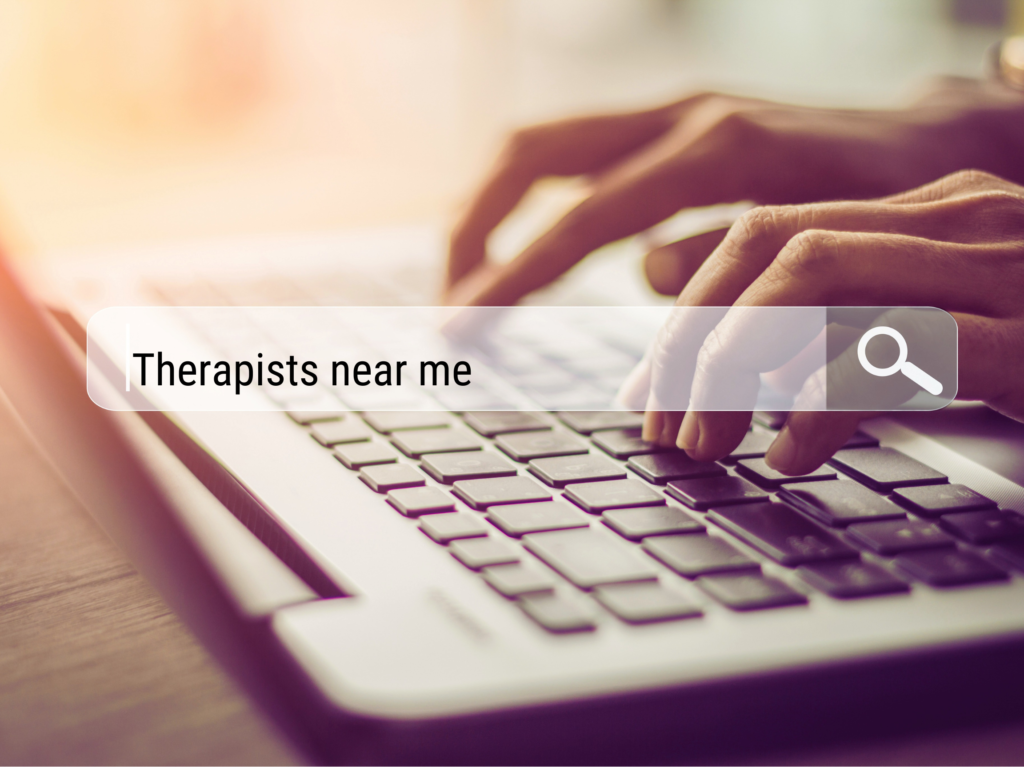How to Find a Therapist (Without Losing Your Mind in the Process)

Finding a therapist might seem simple at first – after all, we’ve all got access to Google, right? But the truth is that there’s more to how to find a therapist than just searching ‘therapists in [your city]’ and clicking through Yelp or Google reviews. Not only does it take a lot of legwork to contact a selection of therapists who might not have room on their client list in the end, but once you do connect with someone who has availability, there’s no guarantee that they’ll be the right fit for you.
If this is all sounding a bit intimidating, that’s fair enough. But we’re not here to put you off the hunt – we’re here to make it easier! We’ve got some tips to help you make your initial list, make contact, and narrow it down to your top options, so you can start ‘dating’ therapists and find ‘the one’ faster.
Step One: Finding therapists and making your list
The research phase of therapist-hunting is, in some ways, the easiest. If nothing else, it can be done semi-mindlessly on your phone while you ride the bus to work. But even though it takes the least focused energy and emotional fortitude, this stage can be overwhelming, especially if you live in a large city with hundreds or even thousands of mental health providers.
The best place to start is an online database – PsychologyToday and the American Psychological Association both have great therapist-finder tools. Once you have the search results for your area, you can sort the list by categories like gender, types of therapy, and insurance. Of course, not all providers will include this information on their profile, so bear that in mind when using the sort function.
If you can find them, online reviews can be helpful, but since therapy is so extremely personal it’s worth remembering that other people’s experiences are unlikely to illuminate yours. Click through and read the profiles of the therapists in your area, keeping in mind the qualities that matter to you. Most good therapists will also have a google business profile that can give you some insight into their practice. Some examples might include:
- What kind of therapy they practice – for example, if you’re looking for concrete results in a set timeframe, you might look for someone who practices cognitive behavioral therapy (CBT)
- Whether they work solely online, in person, or a combination
- Their gender, race, or other personal background – this is very important to some people, and if you’re one of them you should have no qualms about seeking the right fit
Gather around ten names to contact first; you can always add more later, and if you start with an enormous list you might get too overwhelmed to move forward with the next step.

Step Two: Making initial contact with the therapists you’ve found
If you’re lucky, the therapists on your list will have email addresses or online contact forms, in which case you can write a generic message and send it to all of them. Some practices even allow you to schedule a consultation right on the website. You’ll want to ask three things in this initial contact (or voicemail, if you do have to pick up the phone and call):
- Do they have any availability, and if so what days/times?
- Do they take your insurance, and if not how much do they charge out of pocket? (Session fees can be notoriously expensive, although affordable therapy does exist.)
- Can you set up an initial phone conversation, and if so what’s their availability?
That initial phone consultation will probably last about 15 minutes, and you should practice a one-sentence ‘elevator pitch’ of what you’re hoping to work on ahead of time, so you can cut right to the chase (for example, are you there to deal with a particular trauma, or general anxiety or depression, or work stress, or relationship issues, etc).

Step Three: Pick your favorites and try them out!
During your initial calls with therapists, try to get a general sense of the chemistry between you two, and make sure you ask about the things that matter most to you. Are you looking for a structured approach with a finite timeline? Tough love approach or gentle validation? How important are things like LGBTQ understanding or experience? Don’t be afraid to ask questions – that’s what this call is for.
No matter which therapist you end up talking to, you should never feel judged for anything you say in session, and you should always feel comfortable expressing your feelings and sharing your experiences. Of course, it may take a little time to open up, but your therapist should always make you feel as safe as possible.
When it comes to your first appointment, start with your top choice and give it a couple of sessions before you decide – maybe you’ll never need to move down the list to number two. Some people marry their high school sweethearts, right? But if it’s not a fit, you’ll be prepared with at least two or three other people to meet, to keep your momentum up.
So now that you know how to find a therapist, you can get started on the journey to feeling better! Alternately, if it all sounds way too overwhelming, you can just sign up for Prospera! Our mental health coaches are all kind, understanding people with degrees in psychology, experience in the mental health care field, and extensive training and support from licensed psychologists to provide extremely effective CBT. Plus, our subscription is super affordable – just $9 a week for your first month!
Content reviewed by Dr. Andrea Niles, Clinical Psychologist
Anne Godenham is a writer and editor with a passion for mental health awareness and accessibility


